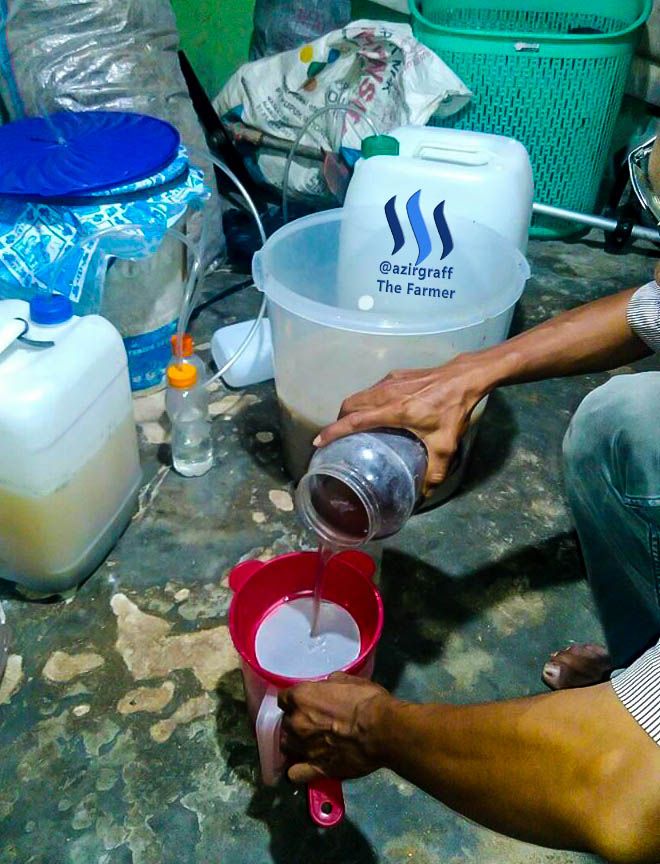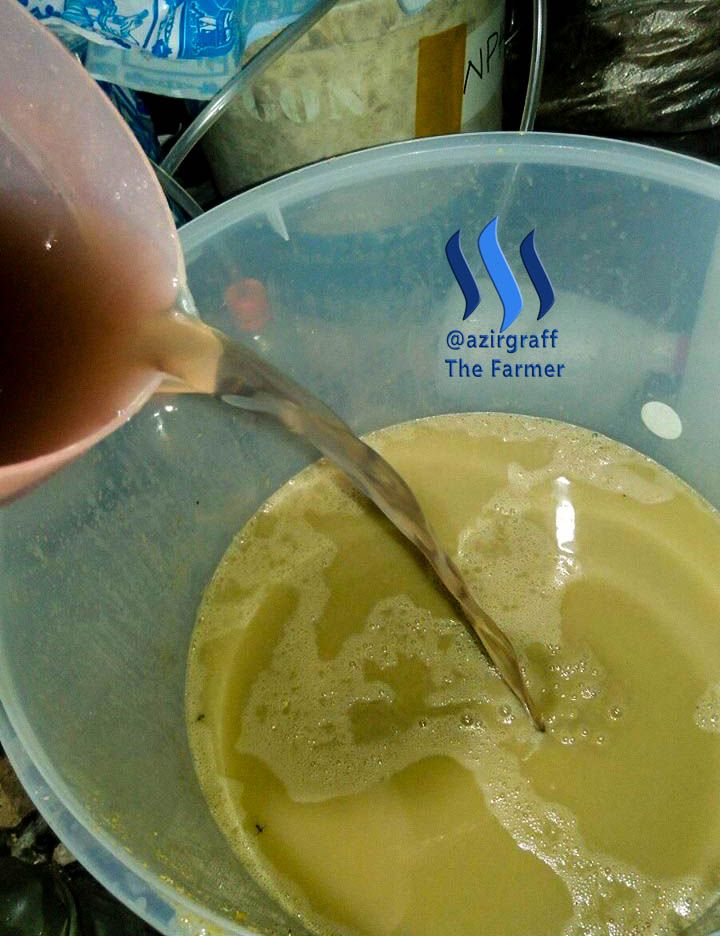How to Make Organic Fertilizer
Hi friends Steemit all, hopefully always in good health, before is I have discussed about rice varieties. So, in the post This time @azirgraff will discuss about organic fertilizer and how to make it.

This is the process of making organic fertilizer, The ingredients are from garbage and cattle feed.
Organic fertilizer is a fertilizer composed of living organisms, such as weathering the remnants of the plant, animal and human. Organic fertilizers can be solid or liquid form used to improve physical properties, chemistry, and soil biology. Organic fertilizer contains many organic materials than the content. Sources of organic matter can be compost, green manure, cage manure, the rest of the harvest, (straw, brengkesan, corncobs, bagasse, and coconut husk), livestock waste, industrial waste using agricultural materials, and municipal waste (garbage). Making organic fertilizer is usually by manual or natural without using chemicals.
As we know that fertilizer is one means to increase agricultural production and plantation, By doing the manufacture of this fertilizer, then farmers can save more expenses and the harvest will increase.
Briefly it can be said that liquid-shaped organic fertilizer is liquid fertilizer made from organic materials through the composting process.
Understanding further, liquid organic fertilizer made through the composting process, that is :
Liquid organic fertilizer made by dissolving finished or semi-finished organic fertilizer into the water. Type of fertilizer that can be dissolved can be a green manure, manure, compost or mixture of all.
Characteristics of liquid organic fertilizer of this kind is not much different from solid organic fertilizer, it's just a form of liquid. Think of it like a tea dipped in water and water made into fertilizer.
Liquid fertilizer this type of suspension of the solution is less stable and easily settles. We can not keep this type of fertilizer for a long time. After so usually should be directly used.
How to produce liquid fertilizer like this done by spraying fertilizer on the surface of the soil around the plant, not sprayed into the leaves.
Liquid organic fertilizers made from organic materials fermented under Anaerobic conditions with the help of living organisms.
The raw material from organic material that has not been composted. The nutrient elements contained in this liquid fertilizer solution are completely liquid. So, the solution is more stable and if allowed to this fertilizer does not settle.
Characteristics of liquid fertilizer like this, in contrast to liquid fertilizers made from solid fertilizers dissolved into water.
So, my main discussion refers to liquid organic fertilizer on the second type
Before we describe how to make organic fertilizer, we see first properties and characteristics of liquid organic fertilizer.
Liquid organic fertilizer can not be used as the main fertilizer in cultivating crops. We recommend using solid organic fertilizer as the main fertilizer / base. The reason, solid organic fertilizer will be stored longer in planting medium and can provide nutrients for long term.
This type of liquid fertilizer is more effective and efficient when applied to the leaves, even more easily digested by plants for both flowers and stems than on growing media (except on hydroponic methods). But liquid fertilizers are more susceptible to erosion.
Liquid organic fertilizer can serve as a stimulants to grow. Especially when the plants begin to sprout or when the change from the vegetative phase to the generative to stimulate the growth of fruit and seeds. Leaves and stems can absorb directly the fertilizer provided through stomata or pores that exist on the surface.
Giving excessive fertilizers on the leaves will also invite pests and diseases in plants, even must be careful, don'ts overdose. So, the accuracy of the dosage should be really paid attention for maximum results.
We need to know further, that each plant has the capacity to absorb nutrients as food.
Theoretically, plants are only able to absorb nutrients available in the soil no more than 2% per day. On the leaves, although exact figures have not been found, can also estimated not more than 2%. Therefore, the giving of liquid organic fertilizer on the leaves should be diluted first.
Because of its nature as an additional fertilizer, liquid organic fertilizer preferably rich in micro nutrients. While macro nutrients are fulfilled by the main fertilizer through the soil, liquid organic fertilizer should provide more micronutrients.
How to make liquid organic fertilizer
- Prepare the following ingredients : 1 bag of chicken poop, half sack of bran, 30 kg forage (straw, banana gedebog, leguminous leaf), 100 grams of brown sugar, 50 ml bioactivator (EM4) and clean water sufficiently.
- Prepare a 100-liter airtight plastic bar or drum as a medium for making fertilizer, one meter transparent aerator hose (diameter approximately 0.5 cm), 1-liter aqua plastic bottle, then make hole the barrel the size of the aerator hose.
- Cut organic ingredients into raw materials, Insert it into the barrel and add water, composition: 2 parts organic matter, 1 part water. Then stir until evenly distributed.
- Dissolve bio activators such as EM4 and brown sugar 5 liters of water stirring until evenly distributed, Then add the solution into a vat containing the raw material of the fertilizer.
- Close the barrel tightly, then input the hose through the lid of the barrel that has been given a hole. glue the hose so that there is no air gap. Let it the other end of the hose into the bottle that has been given water
- Make sure it's really tight, because the reaction will take place anaerobically. The function of the hose is to stabilize the dough temperature by removing the resulting gas without having any outside air coming into the barrel
- Wait up to 7-10 days, To check the level of maturity, open the cask cover then smell the dough.
- Separate the liquid with the dregs. After separated, dregs mixture can be used as a solid organic fertilizer.
- Insert the liquid that has passed the filtration on plastic bottles, then close tightly. Liquid organic fertilizer has become and ready to use.
Thus, for the use of liquid organic fertilizers can be applied directly to the leaves flowers or stems. by diluting the fertilizer using clean water first, then sprayed on the plant. Liquid organic fertilizer to be sprayed should not be more than 2%. In most products, dilution is done up to 100 times. That is, every 1 liter of fertilizer is diluted with 100 liters of water.
To stimulate the growth of leaves, liquid organic fertilizer can be sprayed on new plants sprout, Meanwhile, to produce fruits, seeds or tubers, fertilizer is sprayed when the vegetative phase changes to the generative, Can be sprayed directly on flowers or on stems and leaves. Each spray should be done at one week intervals if it is dry or 3 days in the rainy season. However, this dose should be adjusted again with the type of plant to be sprayed.
In the case of fertilization for leaf growth, use a liquid organic fertilizer that contains lots of nitrogen. The trick is to make fertilizer from nitrogen-rich raw materials such as chicken manure, forage and straw. While in the case fertilization for fruit growth, use raw material of fertilizer which is rich in potassium and phosphorus, such as goat manure, cow dung, rice husks and bran.
Simply put, to make leaf stimulant use organic source material leaf leaves. Meanwhile, to make fruit stimulant fertilizer use organic ingredients from fruit waste such as rice husk or fruit skin.
All the pictures I put on this post are the result of organic fertilizer processing and the photo is taken at night using the xiaomi note camera
Conclusion.Organic fertilizer is a fertilizer derived from natural ingredients, either from cattle dung, food scraps or from waste and others. Making organic fertilizer can be manual or natural.
Benefits of using organic fertilizers in agriculture and plantations ie can increase production yield, can save costs, environmentally friendly and can fertilize the soil for a long period of time.
Here is my discussion on this occasion, the lack of writing must be there, so I still apologize. Thanks to all the friends at Steemit who have visited my blog and comments constructively.
Farmer life !!!
Supporting sources.




I think natural fertilizer is a great alternative to many artificial brands currently on the market.
Using natural fertilizers, the yields are different from using a widely marketed fertilizer. But among farmers still many who do not understand how to manufacture organic fertilizer. Thus, the majority of farmers many still use anorganic, Only a small part uses organic fertilizer.
liquid organic fertilizer is very useful for plant growth. I really like that
your knowledge is very useful, because with this alternative our earth can be saved
Thanks @kharrazi, This account will be the world of agriculture.
Great, that will be nice
Thanks @kharrazi
bereeh that
Thanks
informasi lagak that, di daerah kamoe tutut, le ek lumo ngen kubeu, peu jeut taolah lagee nyan? hehehe
Hana suah le olah, langsong ba laju u blang, nyan kajeut keu pupok..